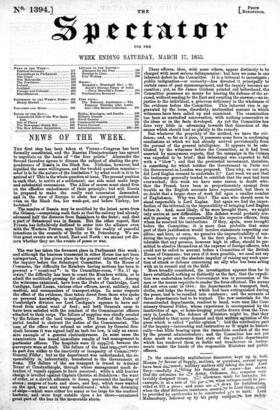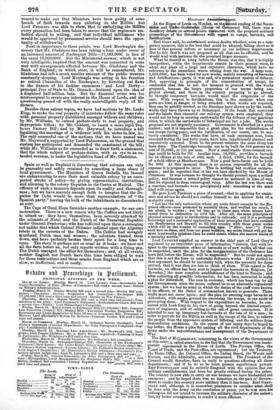_Tti the excessively multifarious discussion kept up in both R ouses
,v2v favour of Supply, motions, or questions, several topics have beeii
Grey—usefully military matters still taking the lead. Lord
that the estimates for -a.e Ordnance, fllling his functionof censor—has shown lavishly-designed items. &c., comprise viiroyr
example, is at a rate of 71'1/1I;eraLloawn7nco made for baruriadcb-e, pr
vided at 37/. a piece; and sums are b. ouoida when cottages co .. .p - t ,down for fortifications when the chief defensive resistance, accorcti:1C to Lord GroJI ihro re nata. L_ r ihro re nata. L_ r be provided by earthworks to be constructed-
Malmesbur followed up by his party coadjute,re, has ,911d...FP1 Toured to make out that Ministers have been guilty of some breach of faith towards men enlisting in the : but Lord Panmure was able to show, that in embodying the Militia every precaution had been taken to secure that the regiments em- bodied should be willing, and that individual militiamen who would be aggrieved by permanent service should have the oppor- tunity of withdrawing. Next in importance to these points, was Lord Monteagle's dis- covery that Mr. Gladstone has been taking a loan under cover of an increased amount of Exchequer Bills-17,183,000/. in lieu of the usual 16,000,000/. But the Ministerial answer, which is not very intelligible, implied that the amount was connected in some way with arrangements effected between Mr. Gladstone and the Bank of England ; in which store, it will be remembered, Mr. Gladstone had left a much smaller amount of the pnblio treasure constantly sleeping. Lord Afonteagle was acting in his funotion as retired Chancellor of the Exchequer, by ferreting out flaws in the finance of his luckier successors : and Lord Derby— principal Peer of State to Mr. Disraeli—fastened upon the idea of a disguised half-million loan. But the financial crime was too microscopical to create any interest in the House of Lords, and the questioning passed off with the really unintelligible reply of Mi- nisters.
Besides these salient topics, we have had motions by Mr. Locke King, to make the real property of intestates follow the same rules with personal property distributed amongst widows and children ; by Mr. Williams, to extend probate4duty to real property, and impropriate tithes ; by Mr. Cobbett, to enact a more rigid Ten- hours Factory Bill ; and by Mr. Heywood, to introduce a bill legalizing the marriage of a widower with his sister-in-law, &c. The only successful one of the motions that we have named was Mr. Heywood's, supported by Lord Palmerston, on the ground that custom has anticipated and demanded the enactment of the bill; while Mr. Williams so far succeeded as to draw forth a statement, that the whole subject of probate-duties, with an eye to an ex- tended revenue, is under the legislative hand of Mr. Gladstone.



























